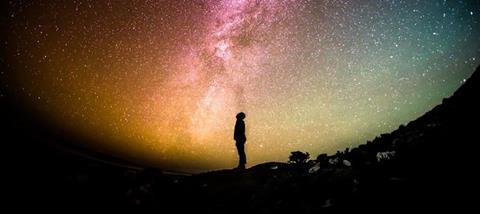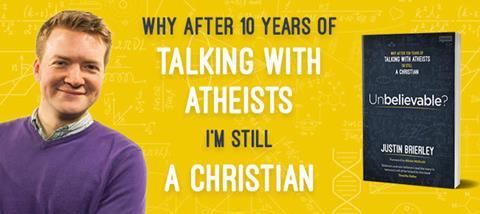
Richard Dawkins began his famous book The God Delusion (Black Swan) by writing: ‘If this book works as I intend, religious readers who open it will be atheists by the time they put it down’. He went on to say that ‘faith-heads’ would never be persuaded, but that there was hope for the ‘open-minded’ as ‘such free spirits should need only a little encouragement to break free of the vice of religion altogether’.
In the ten years since the atheist penned those lines I have embarked on my own journey to examine whether Christian faith is the intellectual suicide that Dawkins claims. I have recorded hundreds of editions of my radio discussion show Unbelievable? between Christians and non-believers on the evidence for Christian faith.
Yet, despite hearing almost every conceivable objection from many of the world’s leading atheists, I have emerged more confident of the rational case for God than ever. Am I a ‘faith-head’ choosing to ignore the lack of evidence? No. On the contrary, I believe there is far more compelling evidence for the existence of God, than against.

Space doesn’t allow for the multiplicity of arguments that could be presented for belief in God, but if a sceptic were to ask me to sum up a few, I would offer the following three reasons.
1. GOD MAKES SENSE OF HUMAN EXISTENCE
I have an atheist friend whose Facebook profile, under ‘religious beliefs’, states: ‘I can hardly believe that I exist’. It’s a good line, but also an ironic one.
The fact is, by scientific standards, human existence is incredibly improbable. Advances in cosmological science over the latter half of the 20th century began to reveal that when the universe came into existence, (more on that later), the fundamental forces it was birthed with were apparently ‘fine-tuned’ to allow for the emergence of life.
Some 30 or so fundamental numbers, such as the force of gravity, the rate of expansion of the universe and the ratio of electrons to protons in the universe, are so exquisitely balanced that the tiniest fluctuation from their actual value would mean that a life-permitting universe could not exist.
Fine-tuning and the Big Bang
The odds of the finely tuned universe we live in coming about by chance are so unlikely that it’s difficult to conceive of the astronomically large numbers involved.
For instance the cosmological constant (the dark energy density of the universe) is fine-tuned within 1 part in 10120. If it had been wide of that tiny mark then the universe would either have expanded too rapidly for galaxies and stars to form or it would have collapsed in on itself before anything formed.
Perhaps the most impressive example is the initial distribution of mass energy to give the low entropy throughout the universe necessary for life. The fine tuning is 1 part in 1010(123). If you took a sheet of paper and filled it with zeros, then reproduced zeros on sheets of paper lined up across the entire universe, 15 billion light years across, that number would still be smaller than 1010(123).
These then are the odds of the correct constants, numbers and forces arising by chance. When you combine all the other odds of the other fundamental forces together, it becomes impossible to believe that our life-permitting universe is a product of chance.
If that weren’t enough, modern cosmology has thrown up a second major surprise. The universe has not always existed. In fact, our best theories suggest that energy, space, matter, and even time itself, came into existence around 14 billion years ago in a sudden period of expansion, known as the ‘Big Bang’.
The theistic implications are clear, and at first atheist cosmologists such as Fred Hoyle resisted the theory until the evidence became overwhelming. A compelling case can be made that for time, space and matter to come into existence, the cause itself must be immaterial, timeless, infinite… and incredibly powerful. There’s one clear candidate for that job – God.
One could also add the fact that the universe is written in mathematical laws that seem to be waiting to be discovered by us. The extraordinary odds that seem to be involved for the first DNA molecule to come into existence; the unusually well-suited planet we live on to allow for the emergence of life, and so the list goes on.
In short, far from pushing God out of the equation, science has been adding to the list of ways in which the cosmic fingerprints of God seem to be scattered across our universe. Of course many sceptics have fielded counter-arguments that run against these lines of scientific evidence. But none that I have heard come close to challenging the overall conclusion that the universe we live in is far more consistent with theism than atheism.
2. GOD MAKES SENSE OF HUMAN VALUE
In the 1970s Jaime Jaramillo, a wealthy businessman, was walking along the streets of Bogota in Colombia when he saw a young girl climbing down through a manhole into the sewers below. Jaime went home, put on a wetsuit and followed the girl into the manhole. To his amazement he discovered about 90 children living in the filthy, rat-infested sewers. The reason for their subterranean living space was that policemen were killing the children who lived on the streets above.
One officer said, ‘Killing these kids is like killing lice. We call them “the disposables”.’ Jaime went on to rescue hundreds of young people and used his money to build a home where they receive an education and live in a loving Christian community.
You probably find that story both inspiring and disturbing. We react with horror at the idea that humans could be treated in such a way – as disposables. But why exactly do we believe that human life should be valued? Why did Jaime do the right thing – the human thing?

The moral argument
I find it very hard to come up with an answer on an atheistic world view. Why should humans have any more claim for special regard on the biological tree of life than a louse? There’s nothing intrinsically special about us in a universe that is blindly obeying the laws of nature. Any beliefs in objective human rights, values and morality are ultimately an illusion, a side-effect of our evolutionary history.
Why then do we feel that view of humanity is so wrong? Why is it really, objectively, wrong to treat children that way? I believe it’s because we have the value of our Maker imprinted on us. Genesis 1:27 says that God created humans ‘in his own image’. That gives humans infinite worth. Anything else makes human worth a commodity, and makes some people disposable.
None of this is to say that atheists are immoral people who don’t have a high view of human worth. Many atheists I meet are passionate about equality and justice. But they didn’t get those values from their atheism. Perhaps unwittingly, they have had to borrow from a distinctly Christian concept of moral worth instead.
3. GOD MAKES SENSE OF HUMAN PURPOSE
In River out of Eden (Weidenfeld and Nicolson) Richard Dawkins writes: ‘The universe we observe has precisely the properties we should expect if there is, at bottom, no design, no purpose, no evil, no good, nothing but blind, pitiless indifference.’
And he is absolutely right…if there is no God. If atheism is true then there is no ultimate right or wrong, there is no overarching narrative. All human endeavours and self-made purposes will ultimately be gone and forgotten in the future. As the universe continues to expand and its energy dissipates, all that will eventually be left is a cold, sterile void with no memory of our brief existence.
But I see a very different universe to Dawkins. Where the atheist scientist sees only physical processes and laws that give rise to illusions of morality and free will, I see real beauty, truth, love, good and evil, purpose to life, freedom to choose and ultimate hope.
I can’t prove that scientifically. But I can point to the universal experience of all humans who have a yearning for something beyond our physical existence – for ultimate purpose, value and meaning.
CS Lewis identified why only God makes sense of this desire, saying: ‘A baby feels hunger: well, there is such a thing as food. People feel sexual desire: well, there is such a thing as sex. If I find in myself a desire which no experience in this world can satisfy, the most probable explanation is that I was made for another world.’
Two stories
Atheism and Christianity tell two very different stories – one is of ultimate purposelessness and the other is of ultimate hope. Hope that there is a reason for our existence, hope that our lives mean something, the hope that death is not the end. Is it a delusion? Faith in spite of the evidence?
I have met many atheists in ten years of recording Unbelievable?. Almost all of them have been very intelligent, honest people. When I critique their worldview I am not dismissing their own honest search for the truth.
But we do see things very differently. I find it very hard to believe that the rational and ordered universe we live in came from nowhere and is heading nowhere. I find it impossible to conceive that our intrinsic beliefs about human value are an illusion, and that our ultimate hopes for purpose and meaning are in vain. In my experience it makes far more sense to read God’s fingerprints and purposes both in the universe he created and in our human experience too.
Read more in Justin Brierley’s book Unbelievable? Why, after ten years of talking with atheists, I’m still a Christian
























